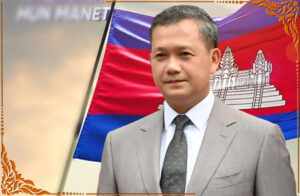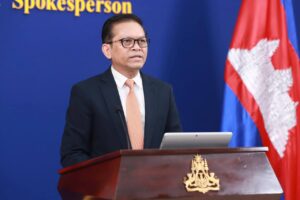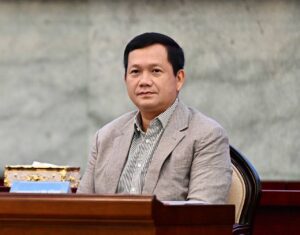(Video) Selected Comments of Samdech Thipadei Hun Manet, the meeting with informal economy, trade Unions and teaching staff associations to celebrate the 139th anniversary of the International Workers’ Day – “Together for Decent Work and Sustainable Growth and Resilience” [Unofficial translation]
[2]
(1) Creating more jobs with better pay and labor protection
(The Minister of Labor and Vocational Training), HE Heng Sour just read the principles that Samdech Techo (the former Prime Minister) laid out, and also the 10 points that I put forward at the beginning of my mandate, showing that we aim to provide both rights and benefits to workers and nothing else […] We negotiated with concerned parties to get salary increases, organize the National Social Security Find, organizing transportation safety, organizing childcare centers, etc. […] (The Royal Government adheres to the) principle of creating more jobs to absorb labor, provide opportunities and choices both domestically and internationally […] We strive to create more jobs by not concentrating (job opportunities) only in Phnom Penh, but spreading them out to the localities and provinces, so that it is not difficult for you to migrate […] What does (job quality) mean? Firstly, to get an increase of salaries, and secondly, respecting labor laws. You work with respect. Workers are not oppressed by their bosses without labor laws (protection) […]
[4]
(2) Demand for capable and highly skilled workers grows
Workers across the country can see that in their villages, new factories are opening, recruiting new workers. Tens of thousands of Cambodian citizens can be witnesses. Kampong Speu Province has claimed that it is difficult now to find (workers) from within the province/region. They have to find people from outside (the province). About 4 or 10 years ago, there were few factories, and people were competing for jobs. Now there are (jobs) that are lacking (workers). Not only factories. The private sector (in) service industry, the banking sector, etc. also need more employees […] Those who work since the minimum wage of $40 can know that the rights and environment in factories, compared to now, have improved a lot […] Now, factories do not only produce clothes and shoes, but also produce electrical components, assemble modern cars in the country […] We are proud that Cambodians are capable, have high skills, and are highly skilled […]
(3) More children with better health, knowledge and abilities to defend the nation
To create quality jobs, we are thinking about everything, thinking about mothers, health, skills, salaries, children, and the living condition of citizens, such as for them not having to go far away from home to work. We build roads, we locate factories and enterprises closer to homes, and we create training courses in the provinces. For citizens who cannot financially afford it, we have issued a policy to provide scholarships for 1.5 million people to have access to training, with the state even providing some financial support […] I encourage our people to have more children. Children that are born with better health, will learn to have more knowledge and abilities […] We protect the territory, defend the nation, and handle border negotiations responsibly, developing both the border areas and the interior more strongly […]
(4) Cambodians now invest abroad – it is the law of free trade
Cambodians have access to jobs both at home and abroad. We are trying to expand domestic job options but not to close the doors for job accession abroad. Some say we send Cambodians to be servants abroad. In all ASEAN countries, no country that has not got their citizens working abroad […] Why are we doing this? To open doors (to provide job options) for you […] We have labor consultants, we have ambassadors to care for and protect the law (for) those who are in danger, those who die, those who have problems while working abroad […] Thinking about the well-being of the people, not only about salaries, opportunities, but also to expand (job opportunities) in the country in every way, attracting investment both from abroad and from within […] Before, we only had factories from abroad. Now, we are the owners (of) agroindustry, manufacturing, cement, steel, and other things in the country and invest abroad, such as in banking […] This is the law of free trade. Mutual complementarity, without anyone living independently, now, especially small countries […]
[5]
(5) Since its formation, RGC have intervened the increase of the workers
In the years that we were affected by both the COVID-19 and the economic slowdown, Cambodia has never failed to increase the salaries of workers […] Whether it was a little or a lot, we have always increased them. This is the goodwill of the Royal Government […] Goodwill is not just something written on paper and I say it through a microphone. I remember that since the new Royal Government was formed, we have increased it after two rounds of negotiations […] Whether it is a little or a lot, in difficult circumstances, it shows practical action that the Royal Government has been always thinking about the interests of the people […] With just two USD increase to the basic salary, the Prime Minister has asked for understanding from enterprises and employers to add about 40 million USD more a year to distribute to the workers. This is the meaning of increasing the minimum wage, which is going into the pockets of the people […]
[6]
(6) At Riel 15,600 or USD 3.91/month, workers’ dependents have free medical checkup and treatment
(Healthcare for dependents, members of the National Social Security Fund and individuals in the informal economy, based on voluntary principles, starting with self-employed individuals) is an additional benefit. Previously, workers with a national social security card could go for his/her own checkup and/or treatment for free, but their children had to pay for treatment […] Now that they pay 15,600 riels (USD3.91) a month, their children could go for medical checkups and consultations without spending money […] I believe that in the past 19 months, 1.2 million new people have registered. People must have seen the real benefits […] The cost of health care is increasing, and we cannot reduce it. The more modern medical equipment and medicines are, the more modern each doctor or clinic is, the more expensive it must be. But the national social security card, as well as other programs, helps keep money from coming out of people’s pockets. No matter how much the cost of treatment increases, you can still go to treatment and only pay 15,600 riels/month. The state will compensate other due fees. This is a win-win formula for all […]
[7]
(7) The 1.5 million scholarships help people realize new skill acquirement and/or improvement
Regarding this work (of training vocational and technical skills for 1.5 million young people from poor and vulnerable families) I have asked all provinces to help spread the word in their districts, and to ask unions and representatives to help spread the word to citizens […] Those in the informal economy and those who have registered can go (for such training) and get a certificate to improve their qualifications […] If they have skills, we will create a standard to evaluate their work. If they have talent, then […] the ministry can evaluate (and issue a certificate) for them […] For what? So that those outside the formal economy have the opportunity to enter the (formal economy) system. They enter the system so that they can receive benefits without coercion and have clear qualifications in the future. In the future, most jobs will be competitive and require a certificate or other document to prove their skills […] The 1.5 million scholarships and TVET vocational training, not only equip them with new skills, but also, for those who want to change careers, can learn new skills to change jobs, or to improve their level, (they can achieve their goals) […]
[8]
(8) Daycare centers, reducing costs water and electricity, safe transportation – among workers’ benefits
(The state gives childbirth allowance of) 800,000 riels for one child. Yesterday, someone who had twins received 1 million 200,000 riels. If there are triplets, 1 million 600,000 riels. If there are quadruplets, 2 million riels […] (and) there is also a big subsidy […] We have also extended this consideration to women who are criminals in prison. Mothers may have committed wrongdoings, but with virtue as a human being, the state considers that since the child is innocent […] There has been effort to open daycare centers in the workplace with teachers to help them learn since childhood […] Two more factories are ready to open (daycare centers) in 2025. Gradually, this effort picks up according to the capabilities of the factory enterprises […]
As far as the costs of water and electricity are concerned, the state has worked with the landlords of the workers to provide a reasonable price […] We are working to guarantee safe transportation arrangements and welfare […] Some companies have requested to invest in buses of transporting them. However, while considering the welfare of the workers who travel to and from works, we must also take into consideration, the living condition and job of those private drivers […] Please find a formula in which they win together. Find a formula to help him/her be able to transfer gradually, increase capacity, and increase safety together […] Maybe work with communities, associations, and drivers to find a win-win solution that benefit workers […]
[9]
(9) Trade unions and professional organizations to bring no other issues and promote the concept of “peaceful communities”
Regarding the (promotion of the rights and freedoms of professional organizations in accordance with the Law on Trade Unions and International Labor Conventions) […] I urge the representatives of trade unions, perform their duties true to and within the framework of the profession, in accordance with the laws that we can implement […] The government strives to resolve the issue within the framework of the law, trying to be fast, effective, and without bias […] (When it comes to) wanting, everyone always wants more, but if it goes beyond the principles of the law, we cannot provide them. Workers are going to be caught in the middle […]
I am asking the trade unions and professional organizations, as representatives, protect the interests of workers, join in finding solutions in accordance with the law, within the framework of the profession, and do not bring other matters into the work of the union […] The government and the union are not enemies. We will work together to solve the problem, find benefits, find solutions so that our houses do not burn down. If our houses have to be closed, the factory has to be closed, the state will strive to help find ways to provide compensation and benefits that the law allows […] Let us promote the program of harmonization of work, good families, happy families. The Ministry of Labor and Vocational Training, in its word, calls the “peaceful communities” […]
(10) Enforcing the law, exercising rights responsibly, to guarantee peace to attract investments
We enforce the law, exercise rights responsibly, to guarantee peace, so that Cambodia is more attractive for investment. Investors will not come if our country is plagued with protests all over the country. But if there is harmony, companies come to do business peacefully, problems are solved quickly, effectively, it would be easier for them than going to other countries […] The fact that we can attract more investment that factories expand their (production) chain indicates the participation of workers and unions.
No one helps us except us to help ourselves. The government only ensures the environment and creates relevant policies, but if it is not easy to work, this cannot be achieved. I am very happy to see our brothers and sisters working hard to secure this. It is not without problems, but we solve them – some slowly, some quickly. We, however, are working to the best of our ability to solve them. It is imperative that the Ministry of Labor, the Provincial Office of Labor, local authorities, as well as the employer, the factory administration, the union, and the worker representatives, continue to work together […]
[10]
(11) Once Cambodia’s environment is positive, with our workers’ kindness and hardworking, there marks our competitiveness and productivity
I see lots of people, workers included, coming to spend their times (at the Phnom Penh Walk Street). Influencers post many positive things. This is a joint effort to show the positive effects of our country. Act positively, think positively, have a positive attitude, be friendly, respect each other, spread positivity – all make our country positive […] I intend to go too, but I haven’t had the time yet […] The same is true for investment attraction. As long as (Cambodia’s) environment is positive, with our workers’ kindness and hardworking, there is our competitiveness and productivity […] Last year, there were 414 projects (with a total value) of six billion USD, it was a record-breaking figure […] Hopefully, in 2025, we will be able to attract more and more investment registrations […] In fact, we see factories increasing from 44,798 in 2024 to 45,255 enterprises, and the number of workers increasing from 1.81 million to 1.85 million […]
[13]
(12) Informal economy is the driving force, as long as they grow, the state is relieved
What is the (tax listing) for? We prepare benefits […] Through the Ministry of Industry, Handicrafts and Shipping, the government prepares various policies to provide them with, but not in a forcing way […] We want them to enter the formal economy system so that we can easily know where they are […] During the COVID-19, we wanted to help the informal economy, but we did not where and how to get to them […] As for those in registered factories and enterprises, it was easy […] To date, 42,000 enterprises, most of them self-employed, have registered to receive various benefits. The state has no intention to cause them any trouble. They are the driving force of the economy. If they improve their living standards and business, the state is relieved […] as it makes the informal economy – micro, small and medium-sized enterprises grow […] If they do not use the prepared system, we do not force them, but we would all lose. They do not benefit for their business, and the state does not (receive) the expected benefits that they are more qualified, more capable, more competitive […]
(13) Constant monitoring necessary on policies announced at the top to ensure implementation at the bottom
There are still comments on my Facebook […] about tax and cadastral, regarding the title transference, along which list of documents that was once provided/declared, have had to be resubmitted or what? […] Ministries and institutions have cut out unnecessary processes, but sometimes the procedures are not yet in action. We always speak jokingly – “the policies are good. Looking at the policy, people drop saliva. But when they see the implementation results. They drop tears.”
Sometimes we have policies, but the implementation procedures are not clear, and the effectiveness can be problematic. We announced them at the top, but there are no clear instructions at the bottom, and the lower levels do not dare to implement them. In the end, only the top has announced those policies and those at the bottom do not implement them. We demand constant monitoring so that we can find a solution. Because sometimes the policies we put in place are lacking implementing tool […] Let’s solve the problem together, making May 1st better from year to year for our brothers and sisters […]
[15]
(14) The US tariff is not only on Cambodia but global
Regarding the US tariffs policy […] How is it going? No one knows how this tariff thing will go. I met with the US delegation yesterday. I asked them what’s going to happen next? They said they have no way of knowing since the government hasn’t discussed it with the Congress. Is this a penalty for Cambodia? I wonder if Cambodia is the only country that will be subject to this tariff? Initially (the Trump administration) planned to impose a 49% import tariff, but now it’s reduced to 10%. We’re still have another three months to negotiate with the US administration […] The US is not imposing tariffs only on Cambodia […] This is a global tariff.
This tariff was imposed after examining the export/import figures between the US and other countries, which are too different. The current US president thinks that other countries are taking advantage of the US […] Some say that it all happened because Cambodia imposed a 97% tariff on US goods […] Please note that the 97% is a trade deficit. We export 1,200 million (dollars) to the US, and the US imports 300 million (dollars from Cambodia). (That tariff rate is based on the calculations) of the deficit […] How come the US (calculate tariff) to be 49%? It is because of the trade deficit (mentioned above) and they divided the 97% into two […]
(15) Export less, some curse government for letting others take advantage of, exports more, they accuse government of sucking other country’s blood
The US has to trade with the world […] No country has the ability to produce everything for itself […] Why does the US buy clothes from abroad and not make them themselves? As the economy develops, the skills of the people become higher, resulting the labor cost becomes more expensive […] Instead of producing clothes in the US, they have them produced abroad because (the labor cost of producing) clothes is cheaper […] Some jobs are no longer done in developed countries. So, they have to open production sites abroad and buy the products back […]
Another question is, if we export more to the US, why don’t we buy from the US equally? […] Our country is small and poor […] There must be a gap between rich countries and poor countries. Rich countries have greater purchasing power. Even Europe and the US have a lot of differences in export/import […] The bothering thing is that when there is a trade deficit on the part of Cambodia with some countries, a group of Cambodia people curse the government for being stupid for letting those countries take advantage of Cambodia. When Cambodia exports more, they accuse Cambodia of sucking other country’s blood […]
(16) No choice but work hard to protect the country’s interest, keep what we built stable and protect the benefits of our workers
Trade is a win-win paradigm […] It’s not our fault that we are subject to this tax. It’s because the US government thinks it needs to reap the benefits (more) for its own sake. No country is at fault […] Have we done anything illegal? Are we doing a dirty job, exploiting the sweat of others? We did not do all that. We are doing the right thing according to the agreed upon rules, following the principles of the WTO. Are we stealing something illegal and exporting? No, we did not. We export clothes, solar panels, electrical appliances, and jewelry, with which we create jobs and bring income to people to grow the Cambodian economy. Is the government wrong for doing all that? […]
Some people blamed the government for seeking the investments from China. We have been asking around from this and that country/institution for help to build roads, schools, and infrastructure, so that we can launch factories and the locals can have jobs […] In the face of the current situation that the US government suddenly thinks about its economic situation and imposes such measures […] we have no choice but to work hard to protect the country’s interest so that what we have built will remain stable and protect the benefits for our brothers and sisters […] It does not matter what this or that person says, I will protect the interests of my children, the rice bowls of workers, the country’s economy and for economic growth […]
(17) Tariffs go into effect, the whole world will face with difficulties, but we will not die and diversify exports to other markets
I hope that you will all – workers and trade unionists – accept this reality and understand who is really working on things and who is just talking […] We will work hard to negotiate the US market and find common ground. Next month, I will officially visit Japan to expand further investment. I have just negotiated to expand trade and investment relations with Thailand. Next month, I will go to the ASEAN meeting, where there will be meetings with some private sectors, and we will have an ASEAN meeting with the GCC (Gulf Cooperation Council) to attract tourism and connect trade with the Arab world.
All this for what? They are for attracting and establishing a special economic zone in in Cambodia, to create jobs for more people […] You may ask if going forward, there would be difficult time? Should the US government tariffs go into effect, truly, we will face difficulties (but) it would not be only on us. All 180 countries will face difficulties. However, we will not die. On the contrary, we will work harder to heal and strengthen our potential, diversify exports to Europe and other countries, strengthen production chains, produce local raw materials, increase opportunities, and become stronger. Whatever that does not kill us will make us stronger […]
(18) In the trade storm, examining and strengthening weak points to be more resilient
We are open to negotiate in all directions and at the same time. We will talk to America, but at the same time put on protection with other countries […] Let there be trust, confidence and warmth in the will and determination of the Royal Government to consider and protect the interests of our brothers and sisters, especially the workers, as much as possible. Not only that, but we will try again after this storm has passed. In this trade storm, we are seizing the opportunity by examining ourselves, what are the weak points, and strengthening ourselves to be more resilient […]
When we have the opportunity, the young Cambodians are stronger. Let’s take care of the opportunity that we are having, and taking care of the rice pot […] through (1) protecting our house from fire, protecting peace at any cost, and not fighting each other, and (2) ensuring stability and security, and do not cause internal rift as there was an attempt on August 18, since overthrowing (the government) through what they called “flowering” method was impossible […] We must remember the past. What are the factors that led us to division and to war […] The idea of extreme nationalism is the biggest factor that led us to fighting eah other […]./.






